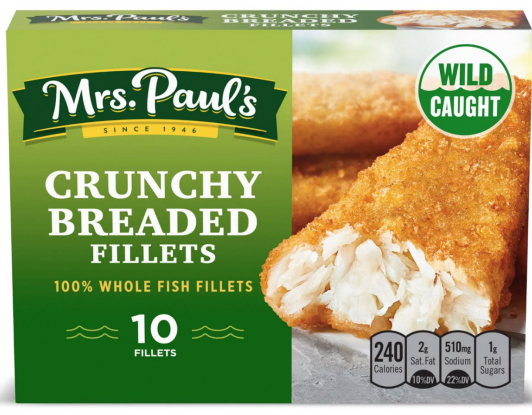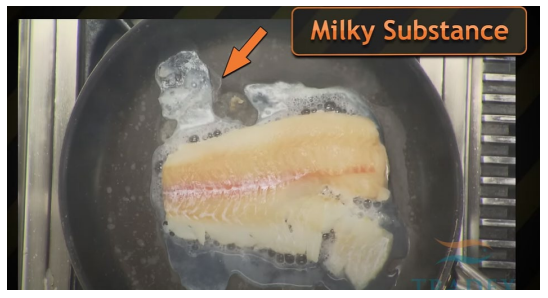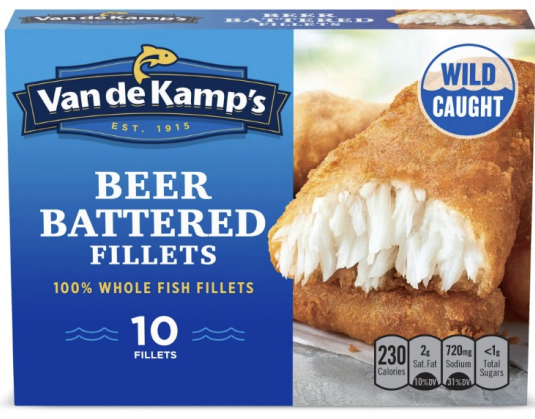Conagra Inflates Weight of Van de Kamp, Mrs. Paul’s Frozen Fish with ‘Industrial Filler’ and Extra Water, New Class Action Says
Last Updated on June 18, 2024
Pappert et al. v. Conagra Brands, Inc.
Filed: June 11, 2024 ◆§ 1:24-cv-04835
A class action lawsuit alleges Conagra Brands has falsely advertised certain Van de Kamp and Mrs. Paul’s frozen fish products.
California Business and Professions Code New York General Business Law California Consumers Legal Remedies Act Massachusetts Consumer Protection Law
Illinois
A proposed class action lawsuit alleges Conagra Brands has falsely advertised certain Van de Kamp and Mrs. Paul’s frozen fish products as “100% Whole Fish” given that the company pumps the food items with industrial filler and extra water, which artificially increases their product weights.
Get class action lawsuit news sent to your inbox – sign up for ClassAction.org’s free weekly newsletter here.
 The 25-page seafood fraud lawsuit accuses the consumer products giant of engaging in “short weighting on a massive scale,” namely by injecting Van de Kamp and Mrs. Paul’s frozen fish with sodium tripolyphosphtate (STPP), which, along with the added water, may “ooze out as a white goo when the fish is cooked.”
The 25-page seafood fraud lawsuit accuses the consumer products giant of engaging in “short weighting on a massive scale,” namely by injecting Van de Kamp and Mrs. Paul’s frozen fish with sodium tripolyphosphtate (STPP), which, along with the added water, may “ooze out as a white goo when the fish is cooked.”
STPP is typically used to manufacture rubber, paint and antifreeze, the false advertising lawsuit claims, noting that the additive is also utilized by “unscrupulous businesses” who work in an industry plagued by short-weighting (i.e., when processors misrepresent the weight of a seafood product) and other forms of supply chain fraud.
“That is the case here,” the proposed class action summarizes.
According to the lawsuit, STPP is a colorless, tasteless, odorless chemical produced on a large scale as a component of industrial products such as commercial detergents, ceramics and flame retardants, among others. In large quantities, the filing says, STPP is a registered pesticide, known air contaminant and suspected neurotoxin.
The lawsuit states that wastewater treatment does not remove significant amounts of STPP and that the chemical, in fact, reacts to water by breaking down into phosphate. As a result, STTP ultimately contributes to eutrophication—which occurs when nutrients accumulate in a body of water, causing the depletion of oxygen and an increase in algal blooms and bacteria—of freshwater sources, the suit explains, calling this process a “phenomenon typically associated with poorly treated sewage water, industrial wastewater and fertilizer runoff.”
According to the case, STPP can be used to short-weight seafood if, for example, an STPP-treated fish is stored in an STPP soaking solution. This water retention “makes the fish heavier when it is weighted,” and the amount of extra weight added via STPP processing can average 13 percent, depending on the concentration of the solution, the suit states.
The filing stresses that not only do consumers end up paying more for STPP-treated seafood, but the product “decreases in size and changes in texture when the water is cooked out.” Per the suit, excessive STPP treatment will destroy the quality of a fish’s protein during cooking and can create a “soapy” flavor and mushy texture.

The specific Conagra products whose weights are allegedly altered via STPP treatments include:
- Van de Kamp’s Crispy Battered Fillets, Crispy Haddock Fillets, Crunchy Breaded Fillets, Beer Battered Fillets, and Van de Kamp’s Fish Sticks; and
- Mrs. Paul’s Crispy Battered Fillets, Crunchy Breaded Fillets, Beer Battered Fillets, Lightly Breaded Haddock Fillets, and Fish Sticks.

The lawsuit highlights that the “100% Whole Fish” claim on Van de Kamp’s and Mrs. Paul’s product packaging is not disclaimed or modified on product labels, and no asterisk or marking is present to suggest that a reasonable consumer should look elsewhere on the label to understand the “true meaning” of “100% Whole Fish,” the filing says. Even buyers who look at the back product label would see statements that reinforce the “100% Whole Fish” claim, as well as claims that the seafood items are “good for the environment,” “sustainable,” “wild caught” and “traceable,” the suit shares.
Per the case, the only mention of STPP on product labels is “buried in fine print” in a way meant to ensure that very few consumers read it. Though this tiny disclaimer specifies that STPP is added to the fish to “retain moisture,” the chemical is in truth added to “bulk up” the seafoods’ weight and size and retain the water that has been artificially pumped in during processing, the lawsuit alleges.
“A reasonable consumer has no reason to check what a product is ‘composed’ of when the product labeling is replete with representations that it is ‘100% Whole Fish,’ healthy, and caught in the wild. Any consumer would reasonably assume without having to check parentheticals in the ingredient list that the products contain 100% Whole Fish, and not some fish and STPP and water pumped into the products in a processing plant.”
The lawsuit looks to cover all people in the United States who bought any of the Conagra Brands seafood products listed above for personal or household use in the last four years.
Are you owed unclaimed settlement money? Check out our class action rebates page full of open class action settlements.
Video Game Addiction Lawsuits
If your child suffers from video game addiction — including Fortnite addiction or Roblox addiction — you may be able to take legal action. Gamers 18 to 22 may also qualify.
Learn more:Video Game Addiction Lawsuit
Depo-Provera Lawsuits
Anyone who received Depo-Provera or Depo-Provera SubQ injections and has been diagnosed with meningioma, a type of brain tumor, may be able to take legal action.
Read more: Depo-Provera Lawsuit
How Do I Join a Class Action Lawsuit?
Did you know there's usually nothing you need to do to join, sign up for, or add your name to new class action lawsuits when they're initially filed?
Read more here: How Do I Join a Class Action Lawsuit?
Stay Current
Sign Up For
Our Newsletter
New cases and investigations, settlement deadlines, and news straight to your inbox.
Before commenting, please review our comment policy.